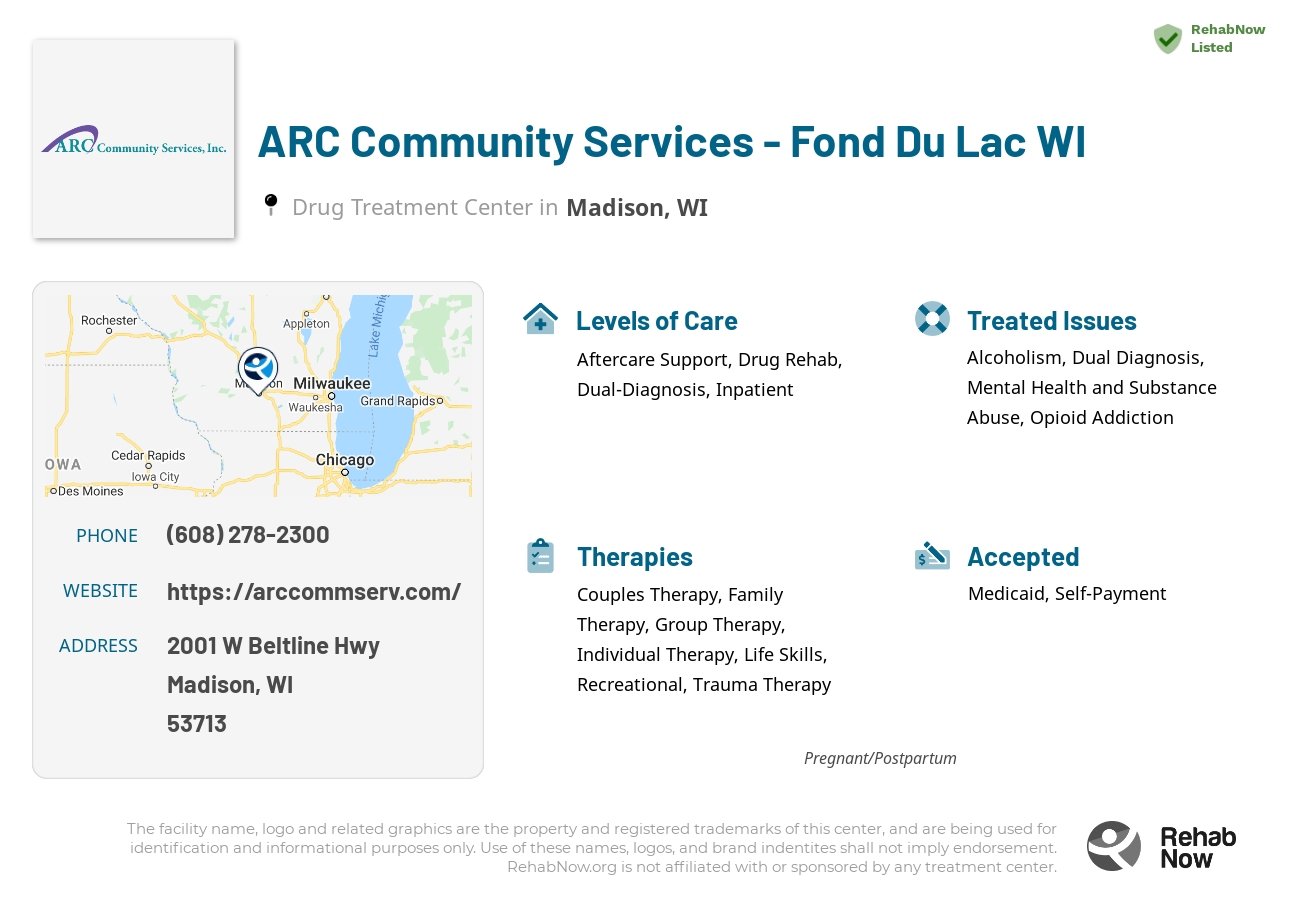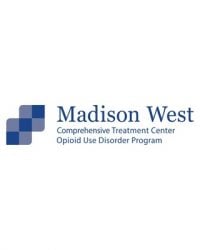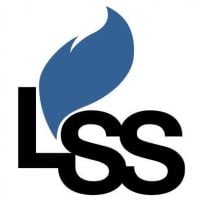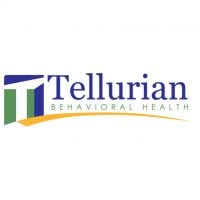ARC Community Services - Fond Du Lac WI
Drug Rehab Center in Madison, Wisconsin
ARC Community Services of Fond Du Lac, WI offers specialized therapies, counseling and aftercare support for individuals struggling with addiction, dual-diagnosis or co-occuring disorders, tailoring a variety of therapeutic methods including group/individual therapy, life skills classes, recreational therapy, couples/family therapy and cognitive behavioral therapy for a successful, long-term recovery.
About ARC Community Services - Fond Du Lac WI in Wisconsin
ARC Community Services - Fond Du Lac WI is a drug treatment facility located in Madison, Wisconsin. They specialize in providing treatment for individuals struggling with alcoholism, dual diagnosis, opioid addiction, and drug addiction. With a focus on helping people attain sobriety, ARC Community Services offers a range of services and support to assist individuals on their recovery journey. Whether someone is looking for inpatient levels of care or aftercare support, this facility aims to meet their needs and provide personalized treatment options specific to their addiction.
ARC Community Services - Fond Du Lac WI offers various services and treatment methods to support individuals dealing with addiction and substance abuse. Their comprehensive approach includes drug rehab and dual-diagnosis programs to address the physical and mental aspects of addiction. They provide inpatient levels of care to ensure individuals receive intensive treatment and support while overcoming their addiction. Additionally, ARC Community Services offers aftercare support to help individuals maintain their sobriety and navigate the challenges of recovery after leaving the facility. Their treatment methods are tailored to each individual's specific needs, providing a personalized approach to address their unique struggles with alcoholism, opioid addiction, dual diagnosis, or drug addiction.
Genders
Ages
Modality
Additional
Conditions and Issues Treated
Opioid addiction is when someone becomes addicted to opioids. This can happen quickly due to any opioid use. Opioid withdrawal can be uncomfortable and lead the user to continue using even if they want to quit. It’s best to receive inpatient treatment for detoxification.
Even if a person doesn’t need inpatient treatment, it’s recommended to start rehabilitation or at least some kind of outpatient treatment. This is because the withdrawal symptoms from opioids can be uncomfortable and unpleasant, to the point that a person could end up using again or worse.
Detoxification should be done to break the physical addiction of opioids. This can be done with opioid replacement therapy, medication-assisted therapy, or a more traditional detoxification program. Intensive outpatient treatment is a form of addiction care that allows patients to continue living at home while undergoing treatment. This type of care is appropriate for patients who have been treated in residential treatment programs. Intensive outpatient programs include regular visits to the facility providing therapy, and patients gradually return to their routine life. IOP benefits most when patients have a supportive family member or friend to help them recover.
The first step to getting into an intensive outpatient program is to attend a detoxification facility. Detoxification facilities are designed to remove substances from the body safely. The patient will attend sessions designed to help them understand their addiction and its impact on their lives. While in an intensive outpatient program, therapy sessions are scheduled three to five times per week, with the patient attending no more than two sessions in one day.
Dual Diagnosis therapy is considered more successful than traditional rehab methods because it treats the addiction and the underlying mental health disorder simultaneously. This comprehensive approach gives Madison, WI patients the best chance for long-term recovery. If the patient does not receive treatment for both conditions, they are more likely to relapse.
Levels of Care Offered
This center offers a variety of custom treatment tailored to individual recovery. Currently available are Aftercare Support, Drug Rehab, Dual-Diagnosis, Inpatient, with additional therapies available as listed below.
Inpatient facilities offer a complete rehab program where the patient stays for an extended period. This allows the staff to monitor the patient on a round-the-clock basis and provide medical assistance if needed.
A significant benefit of inpatient rehab is that it allows for a safe environment for treatment. The patient doesn’t have access to drugs or alcohol, and they’re surrounded by people that want them to succeed and change their lives. Treatment starts with detox and behavioral therapy, followed by group therapy and family involvement.
Aftercare support is often overlooked in the treatment of drug and alcohol addiction. However, it’s an essential part and should be considered when planning a course of rehab.
Aftercare is a term that’s used to refer to any sort of continuing care offered for a drug addict who has voluntarily entered a rehabilitation program. This type of care can be provided in several settings, including outpatient therapy sessions after the addict has completed an inpatient program. There are also 12-step support groups, such as Alcoholics Anonymous, which can provide additional help for addicts trying to stay sober.
Aftercare is vital because addicts often face many challenges as they attempt to recover from drug addiction or alcoholism. Because of the powerful nature of these addictions, those who struggle with a drug or alcohol problem will likely have to face the craving for their substance of choice for the rest of their lives. Recovering can be a lonely and frustrating endeavor, especially without the support of others who are going through similar situations.
Therapies & Programs
Individual Therapy is a crucial component of addiction recovery. Therapists work with patients to identify the root of their addiction and figure out how to better handle the issues that led to them using drugs. Individual Therapy is one on one sessions where people meet with their therapist. Individual therapy provides a safe space for people to open up and discuss personal and sensitive topics which they may not feel comfortable discussing in a group setting.
In this type of therapy, therapists can develop specific solutions for each patient, which helps speed up their recovery process. In addiction recovery, therapy is a crucial part. It allows patients to go deep into their core issues and discover how those problems can be better handled now. Therapy can be performed in individual sessions as well as group settings. In individual therapy for addiction, the patient meets with the therapist one-on-one to focus on the underlying issues of addiction and come up with solutions to prevent future abuse.
Addiction can take a heavy toll on relationships, damage the trust and intimacy that was once there. Couples therapy at ARC Community Services - Fond Du Lac WI helps to rebuild the trust and intimacy that has been damaged. An intimate relationship with a drug addict is not healthy for children or anyone in the family. Therapist help to rebalance family roles and create a healthier environment after rehab in Madison, WI.
Family therapy is a crucial part of drug treatment and getting sober. It is one of the most effective ways to help addicts stay on the path to long-term sobriety. One of the most important parts of family therapy is the relapse prevention plan. During treatment, therapists and doctors will often sit down with the addict and their family to develop a plan if the addict ever feels like they want to use again. This plan should involve steps the addict and family can take together to prevent them from relapsing in the future.
An addict’s family can play a vital part in helping them to avoid relapse because they can spot the warning signs and help them get back on track before it becomes too much of a problem. Family therapy is one of the most effective ways to help addicts stay on the path to long-term sobriety.
Group Therapy is employed by drug treatment centers like ARC Community Services - Fond Du Lac WI to provide the recovering addict with a platform to talk about their feelings and experiences. It also provides for an opportunity to learn from other addicts who have successfully overcome their addiction. It is recommended that all group members be recovering addicts for this type of therapy to work.
This type of therapy involves the use of a variety of therapeutic techniques to help addicts recover from past traumas that might have triggered their substance abuse. During these sessions, therapists will work with the addict to address painful memories and learn how to cope effectively with stressors as they arise.
During these types of sessions, therapists will typically focus on three main goals:
- Identifying and expressing painful emotions associated with past traumas.
- Reducing the effects of stress on an addict’s life by developing more effective coping mechanisms.
- Developing healthy ways of thinking about stressful situations that can help addicts avoid substance abuse issues in the future.
This type of therapy is typically used in conjunction with other types of addiction treatment services. By identifying and dealing with the root cause of addiction, most addicts can overcome their cravings and prevent relapse once they leave rehab.
Many different types of addiction treatment services exist to help addicts safely get sober, but it’s important for recovering individuals to find a therapist or support group that will help them address the root cause of their addiction.
Cognitive Behavioral Therapy (CBT) is an approach and method in psychotherapy. ARC Community Services - Fond Du Lac WI asks people to investigate how their thoughts, including habitual, harmful, and inaccurate ways of thinking, affect behaviors. CBT is based on the idea that rigid, inflexible ways of thinking cause people to have a limited ability to cope with stress, which leads to emotional distress.
Likewise, CBT helps people identify maladaptive behaviors and replace them with more positive behaviors. It makes you look at the way you perceive something and ask: Is this a realistic belief? CBT asks people to look at the role of behaviors and emotional responses and how they may be distressing in one’s life. The goal of CBT is to change the way people think and behave to achieve a more balanced, healthier lifestyle.
Moreover, CBT has been shown to reduce some types of anxiety disorders, depression, and symptoms related to thoughts or actions that are considered harmful.
Life Skills Services provide services aimed at helping people enter into and maintain long-term sobriety. The services are offered at varying levels of intensity, specific to the needs and requirements of each patient. Some benefits of these services are restoring hope and empowerment, enhancing family involvement, increasing patient compliance, and reducing relapse rates.
Training someone on improved life skills allows someone recovering from an addiction to feel more capable of taking care of him or herself. The skills taught in ARC Community Services - Fond Du Lac WI are daily skills that give a better recovery foundation by simply giving the person tools they need to survive.
Payment Options Accepted
For specific insurance or payment methods please contact us.
ARC Community Services Associated Centers
Discover treatment facilities under the same provider.
- ARC Community Services - Milwaukee in Milwaukee, WI
- Arc House in Madison, WI
- ARC Community Services - Monona Drive in Madison, WI
- ARC Community Services - ARC House in Madison, WI
- ARC Community Services - East Johnson in Madison, WI
Learn More About ARC Community Services Centers
Additional Details
Specifics, location, and helpful extra information.
Madison, Wisconsin 53713 Phone Number(608) 278-2300 Meta DetailsUpdated November 25, 2023
Staff Verified
ARC Community Services - Fond Du Lac WI Patient Reviews
There are no reviews yet. Be the first one to write one.
Madison, Wisconsin Addiction Information
Wisconsin has some of the highest rates in the United States for both adolescent and adult substance abuse. Since 2009, the state has been experiencing the same escalating rates of drug abuse and addiction as the rest of the country. The major concerns are the misuse of prescription painkillers and the escalating number of deaths due to alcohol-related liver disease.
Madison, Wisconsin is struggling with an opioid crisis. In 2017, there were 234 drug overdoses in Madison. 1 in 5 residents knows someone who has died from a drug overdose. 8.3% of Madison residents report heavy drinking. This area ranks 4th among Wisconsin cities for drug use disorders. The centers in Madison offer a variety of services, including individual and group counseling, medication-assisted treatment, and detoxification.
Treatment in Nearby Cities
- Stoughton, WI (12.8 mi.)
- Jefferson, WI (30.7 mi.)
- Neillsville, WI (120.9 mi.)
- Menomonee Falls, WI (66.2 mi.)
- Chippewa Falls, WI (164.4 mi.)
Centers near ARC Community Services - Fond Du Lac WI
The facility name, logo and brand are the property and registered trademarks of ARC Community Services - Fond Du Lac WI, and are being used for identification and informational purposes only. Use of these names, logos and brands shall not imply endorsement. RehabNow.org is not affiliated with or sponsored by ARC Community Services - Fond Du Lac WI.





